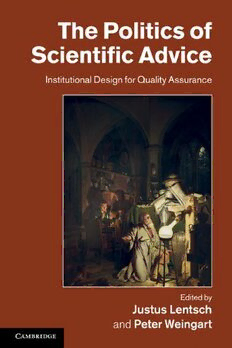
The Politics of Scientific Advice: Institutional Design for Quality Assurance PDF
402 Pages·2011·1.687 MB·English
Most books are stored in the elastic cloud where traffic is expensive. For this reason, we have a limit on daily download.
Preview The Politics of Scientific Advice: Institutional Design for Quality Assurance
Description:
Controversies over issues such as genetically engineered food, foot-and-mouth disease and the failure of risk models in the global financial crisis have raised concerns about the quality of expert scientific advice. The legitimacy of experts, and of the political decision-makers and policy-makers whom they advise, essentially depends on the quality of the advice. But what does quality mean in this context, and how can it be achieved? This volume argues that the quality of scientific advice can be ensured by an appropriate institutional design of advisory organisations. Using examples from a wide range of international case studies, including think tanks, governmental research institutes, agencies and academies, the authors provide a systematic guide to the major problems and pitfalls encountered in scientific advice and the means by which organisations around the world have solved these problems.
See more
The list of books you might like
Most books are stored in the elastic cloud where traffic is expensive. For this reason, we have a limit on daily download.
